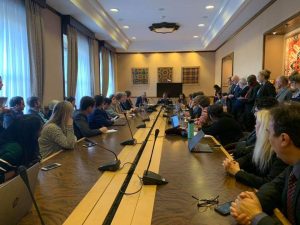 GENEVA (Reuters) – The United Nations investigator on religious freedom said on Tuesday he has asked China to let him visit its Xinjiang region where some 1 million ethnic Uighurs and other Muslims are in facilities activists call mass detention camps.
GENEVA (Reuters) – The United Nations investigator on religious freedom said on Tuesday he has asked China to let him visit its Xinjiang region where some 1 million ethnic Uighurs and other Muslims are in facilities activists call mass detention camps.
Facing growing international opprobrium for what it calls re-education and training centers, China has stepped up diplomatic efforts to fend off censure.
Defending its de-radicalization program in the remote western region, China told diplomats recently that “absurd preachings” from Islamist extremists there had turned some people into “murderous devils”.
“I have requested for a visit to go there, because this a priority for me in terms of looking at what is happening there. There is reason to be seriously concerned about reports coming out of the Xinjiang region,” U.N. special rapporteur Ahmed Shaheed told a news briefing in response to a Reuters query.
China has not yet replied to his February request, he said.
Shaheed, a former Maldives minister, disclosed he was among several U.N. rights experts to write to China last November voicing anxiety at its anti-extremism program.
The letter is also signed by U.N. investigators on arbitrary detention, disappearances, freedom of expression, minority issues, and protecting rights while countering terrorism.
“I wrote to China along with a couple of other rapporteurs on the ‘de-extremification’ law that they are implementing which has resulted in, by some reports, millions being interned,” Shaheed said.
“The concerns we raised were first of all that the laws were overly broadly worded and were targeting essentially protected activities of communities, in terms of their right to thought, conscience and belief. So a whole range of violations occurring in these communities,” he said.
“DEATHS IN CUSTODY”
The U.N. letter voices concern that China’s regulation “targets Turkic Muslim ethnic, linguistic and religious minorities as well as Kazakh nationals” within a context of a “crackdown on the exercise of fundamental rights in Xinjiang”.
It calls on Beijing to repeal the measure.
“There have been allegations of deaths in custody, physical and psychological abuse and torture as well as lack of access to medical care,” it said.
The Chinese regulation defines extremification as the “spreading of religious fanaticism through irregular beards or name selection”, the letter said. The law’s stated aim to make “religion more Chinese” was unlawful, it added.
Xie Zhangwei, a first secretary at China’s mission in Geneva, told the U.N. Human Rights Council on Tuesday that China opposes extremism, discrimination, violence or intolerance.
“The various religious groups, believers and non-believers, respect each other mutually and live in harmony,” she added, without mentioning Xinjiang.
A bipartisan group of U.S. lawmakers complained to the Trump administration on Monday that its response to abuses against China’s Muslim minority was inadequate months after it said it was looking into imposing sanctions.
Reporting by Stephanie Nebehay; Editing by Andrew Cawthorne


